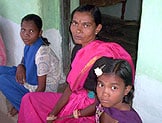

NAGPUR, India (WOMENSENEWS)–A stuffed wildcat still hangs in the little verandah of Chadrakala Meshram’s house.
Her late husband, who hanged himself on Oct. 2, 2006, killed and stuffed the animal himself for a local festival, she says, her eyes lighting up.
"He would perform at the festivals every year," she says. "He was a cheerful man. He loved to have fun; never one to brood or sit around sulking."
What could have made him commit suicide?
"I don’t understand," says Chandrakala, her eyes clouding. "For the last three years the crops were bad. He looked very tired. He would not talk much. He stopped telling me where he got the money he was bringing into the house. Even today I don’t know how much we owe, and to whom."
(First names are being used in the story to aid identification since many people live in tribal communities where a whole village or several villages may share the same clan name.)
Policy-makers, social activists and media commentators here have been grappling with an outbreak of more than 3,000 suicides in the past three years among male farmers of Vidarbha, a region in Maharashtra state.
But while onlookers wonder and debate how to stop the suicides, the steady pace continues with a new suicide tally beginning to build for 2007, a year that is only a couple of weeks old.
The crisis leaves women such as Chandrakala struggling to cope with serious financial uncertainties.
Second Growing Season
Kharif–the first crop after the monsoon season spanning from July to October–has mainly been harvested and the second crop is now coming along.
As many farm widows do what they can to keep up with these demands, they and their families are apprehensive about the debts their deceased relatives left behind. Many don’t know the size of those debts or even who will come to collect or when.
"I will just accept what they say," says Chandrakala, referring to moneylenders. "The man is gone. How can I fight with anyone now?"
Chandrakala, who lives in a village in the region of Vidarbha–which has seen the largest number of farmers’ suicides–says that her husband first borrowed about $300 from a cooperative bank, which typically charge annual interest rates of between 7 percent and 9 percent.
When repeated crop failures in the last four years made him unable to repay he started getting private loans from sources unknown to Chandrakala. She says she does not know either the amount of money he had borrowed, from whom or the rate of interest he negotiated. It is common for moneylenders in this region to charge around 10 percent a month or between 120 percent and 300 percent a year.
"Loans are nothing new to farmers," says elderly Bhagiratha Shende, another villager in the Yavatmal district of Vidarbha whose husband committed suicide several years ago. "We would take loans at the time of sowing and return them after crops as a matter of course. But the loans of today are not like those. They are jeevghenya (life takers)."
Bhagiratha’s second son Anil Shende committed suicide in August. Vandana Shende, his 28-year-old widow, is also a farmer’s daughter.
‘Resowing Such a Horror’
"Resowing is such a horror these days," the young widow says and talks about the $25 cost of a small bag of seeds. "My husband had to take too much loan this year because our crops got washed away by rain twice. Earlier it was not like that."
She says the cost of supplies has risen to such an extent that they barely covered what they sell from their cotton harvest.
Unlike many widows, she at least has a sense of what she owes. Anil, who was farming three acres of land, owed about $300 to a cooperative bank and another $1,200 or so to private moneylenders.
More farm widows are like Rekha Gurnule, who doesn’t know the scale of the debts her husband acquired before his death. "Earlier my husband would discuss every loan he was contemplating with me," she says. "But in the last five or six years things began to go bad."
She says the rising costs of seeds and the onset of droughts and floods drove her husband to make deals that he didn’t talk about. "He started getting haphazard and unplanned loans to meet farming expenses. Around that time he stopped telling me where he was getting the money, how much he was borrowing."
Silence Sounds the Alarm
"Among us farmers, men do not believe in troubling their families with painful things," says Urkuda Bai Atram, an elderly suicide widow. "Men may discuss finances with their families in peace time, but when the pressure mounts they clam up. Then you know it is time to worry."
While women have the legal right to own property, the common practice among older widows is to simply hand over their land to their sons and become farm laborers.
Some, like Bhagiratha Bai, have divided the land among the sons, keeping one share for themselves.
Very young widows, especially those with no children, can be compelled to return to their parental homes. About 30 percent of all the widows in the Vidarbha region have lost their land, according to the Vidarbha Jan Andolan Samiti, a group that has been collecting information on the region’s suicides.
For the younger widows with small children, the problem of keeping their farms going is overwhelming.
"I will have to employ a gadi, won’t I?" says Chandrakala, referring to a contract farm manager. "That will be expensive. I will have to pay a big sum to him every year, which will add to my expenses."
Aparna Pallavi is a freelance writer in India specializing in development issues.


